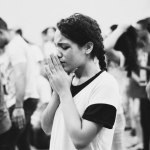Christmas in an Uncertain Time
Dear friends,
Part of what I love about Christmastime is the predictability. My family is big on traditions. Every year, for as long as I can remember, Christmas Eve has followed a very specific formula: a church service that ends with raising our candles and singing “Silent Night,” dinner of beef fondue, butter-baked potatoes and strawberry Jello salad, and then gathering to watch It’s a Wonderful Life. It’s the same every year, like clockwork, even down to the precise moment when we pause the film – just as Jimmy Stewart first appears as grown-up George Bailey – to bring the peppermint stick ice cream dessert out of the freezer. Even half the family falling asleep before the movie’s end is just part of the tradition. The same every year, comfortingly predictable.
This Advent season, however, the dominant theme on my mind is not predictability, but uncertainty. As December 25th looms (my kids are keeping a running countdown), so too does January 20, and the inauguration of a new president of the United States who has pledged to dramatically reshape U.S. immigration policy. Some of those promised changes most evangelical Christians would affirm, such as deporting violent criminals. But many others leave many Christians – and particularly some of our brothers and sisters who themselves are immigrants and their family members – feeling very anxious.
Will President Trump’s pledged suspension of refugee resettlement be temporary, or indefinite – and what will that mean for persecuted Christians for whom resettlement has been a lifeline? What about those whose families were separated, with some already safely resettled but awaiting reunification with loved ones?
Will “the largest deportation in U.S. history” be limited to those with serious criminal convictions and final orders of deportation, or will it also include undocumented individuals who have been quietly living and working in the United States for decades, including those with U.S. citizen spouses or children – and if so, who will care for children left behind when a mom or dad is deported? What about those who are currently lawfully present – including hundreds of thousands from Ukraine, Haiti, Venezuela, Cuba and other countries – whose Temporary Protected Status or parole could be revoked? What about Dreamers brought to the U.S. decades ago as small children, able to live and work lawfully in the U.S. only because of the DACA program, which faces legal threats independent of the new presidential administration? What about their U.S.-born children, their employers, their churches?
Of course, that uncertainty is far from unique to our country. Many of my refugee and immigrant neighbors are watching situations in their homelands from a distance, wondering what will happen next. Many Syrians are grateful for the fall of an authoritarian dictator, but wondering who will govern now and how they will treat religious and ethnic minorities. Ukrainians are marking their third Christmas since the 2022 Russian invasion, wondering whether by next Christmas they will still be in the midst of a war, or living in a free Ukraine, or living under Russian occupation. In so many countries – Venezuela, Haiti, the Democratic Republic of Congo, Burma and far beyond – uncertainty seems like the only sure thing.
The biblical Christmas story is a hopeful companion for uncertain times. I can only imagine that Mary had a thousand questions when an angel informed her that she, a virgin, would give birth – and not to just any baby, but to the Son of God. Would she be cast out of her community for presumed sexual sin? Would Joseph abandon her? Would anyone believe her? But she asked just one question, and then: “Let it be unto me according to your word” (Luke 1:38 ESV).
Even after Jesus’ birth, the questions and uncertainty surely continued. An angel announces her Son’s birth to shepherds; who else were they going to tell? An enthusiastic stranger in the temple warned ominously that “a sword” would pierce her soul (Luke 2:34) – what on earth did that mean? Her husband insists they had to flee to a foreign land (Matthew 2:13-14) – but would they be welcomed? Would they escape before Herod found them? She “kept all these things and pondered them in her heart” (Luke 2:19 NKJV).
What Mary knew, from that very first angelic annunciation, was that whatever uncertainty she faced, she was not alone: the Lord was with her (Luke 1:28). Indeed, the Child born to her would be Immanuel, God with us (Matthew 1:23). And that message of hope for Mary is a message for all those facing the uncertainties of our world today: you are not alone, because the Word has become flesh and made His dwelling among us (John 1:14). My prayer in this season is that the Church would accompany those among us who are facing fears and uncertainty, reassuring our immigrant brothers and sisters, in particular, that, though we may not necessarily be able to promise what will or will not happen, we can stand with them – in prayer and in advocacy before governmental leaders – and remind them of the greater promise that God Himself accompanies them. As Corrie ten Boom once said, we can “trust an unknown future to a known God.”
Merry Christmas,
Matthew Soerens
National Coordinator, Evangelical Immigration Table





